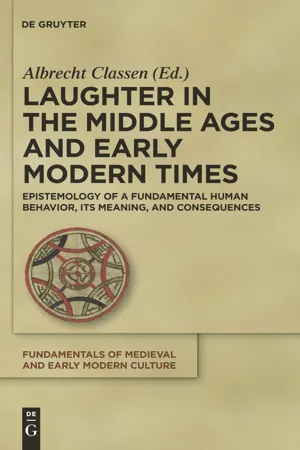
- 862 pages
- English
- PDF
- Available on iOS & Android
Laughter in the Middle Ages and Early Modern Times
About This Book
Despite popular opinions of the 'dark Middle Ages' and a 'gloomy early modern age, ' many people laughed, smiled, giggled, chuckled, entertained and ridiculed each other. This volume demonstrates how important laughter had been at times and how diverse the situations proved to be in which people laughed, and this from late antiquity to the eighteenth century. The contributions examine a wide gamut of significant cases of laughter in literary texts, historical documents, and art works where laughter determined the relationship among people. In fact, laughter emerges as a kaleidoscopic phenomenon reflecting divine joy, bitter hatred and contempt, satirical perspectives and parodic intentions. In some examples protagonists laughed out of sheer happiness and delight, in others because they felt anxiety and insecurity. It is much more difficult to detect premodern sculptures of laughing figures, but they also existed. Laughter reflected a variety of concerns, interests, and intentions, and the collective approach in this volume to laughter in the past opens many new windows to the history of mentality, social and religious conditions, gender relationships, and power structures.
Frequently asked questions
Information
Table of contents
- Frontmatter
- Table of Contents
- Laughter as an Expression of Human Natur in theMiddle Ages and the Early Modern Period: Literary, Historical, Theological, Philosophical, and Psychological Reflections. Also an Introduction
- Chapter 1. Laughter in Procopius’s Wars
- Chapter 2. “Does God Really Laugh?” – Appropriate and Inappropriate Descriptions of God in Islamic Traditionalist Theology
- Chapter 3. Laughter in Beowulf: Ambiguity, Ambivalence, and Group Identity Formation
- Chapter 4. The Parodia sacra Problem and Medieval Comic Studies
- Chapter 5. Women’s Laughter and Gender Politics in Medieval Conduct Discourse
- Chapter 6. Pushing Decorum: Uneasy Laughter in Heinrich von dem Türlîn’s Diu Crône
- Chapter 7. Laughter and the Comedic in a Religious Text: The Example of the Cantigas de Santa Maria
- Chapter 8. The Son Rebelled and So the Father Made Man Alone: Ridicule and Boundary Maintenance in the Nizzahon Vetus
- Chapter 9. Laughing at the Beast: The Judensau: Anti Jewish Propaganda and Humor from the Middle Ages to the Early Modern Period
- Chapter 10. Yes . . . but was it funny? Cecco Angiolieri, Rustico Filippi, and Giovanni Boccaccio
- Chapter 11. Curses and Laughter in Medieval Italian Comic Poetry: The Ethics of Humor in Rustico Filippi’s Invectives
- Chapter 12. Tromdhámh Guaire: a Context for Laughter and Audience in Early Modern Ireland
- Chapter 13. Humorous Transgression in the Non Conformist fabliaux Genre: A Bakhtinian Analysis of Three Comic Tales
- Chapter 14. Chaucerian Comedy: Troilus and Criseyde
- Chapter 15. Laughing in and Laughing at the Old French Fabliaux
- Chapter 16. Laughter and Medieval Stalls
- Chapter 17. Vox populi e voce professionis: Processus juris joco serius. Esoteric Humor and the Incommensurability of Laughter
- Chapter 18. “So I thought as I Stood, To Mirth Us Among”: The Function of Laughter in The Second Shepherds’ Play
- Chapter 19. Laughing in Late Medieval Verse (mæren) and Prose (Schwänke) Narratives: Epistemological Strategies and Hermeneutic Explorations
- Chapter 20. The Workings of Desire: Panurge and the Dogs
- Chapter 21. Laughing Out Loud in the Heptaméron: A Reassessment of Marguerite de Navarre’s Ambivalent Humor
- Chapter 22. You had to be there: The Elusive Humor of the Sottie
- Chapter 23. Sacred Parody in Robert Greene’s Groatsworth of Wit (1592)
- Chapter 24. The Comedy of the Shrew: Theorizing Humor in Early Modern Netherlandish Art
- Chapter 25. The Comic Personas of Milton’s Prolusion VI: Negotiating Masculine Identity Through Self Directed Humor
- Chapter 26. Ridentum dicere verum (Using Laughter to Speak the Truth): Laughter and the Language of the Early Modern Clown “Pickelhering” in German Literature of the Late Seventeenth Century (1675–1700)
- Chapter 27. Andreae’s ludibrium: Menippean Satire in the Chymische Hochzeit
- Chapter 28. The Comic Power of Illusion Allusion: Laughter, La Devineresse, and the Scandal of a Glorious Century
- Chapter 29. Laughing at Credulity and Superstition in the Long Eighteenth Century
- Backmatter